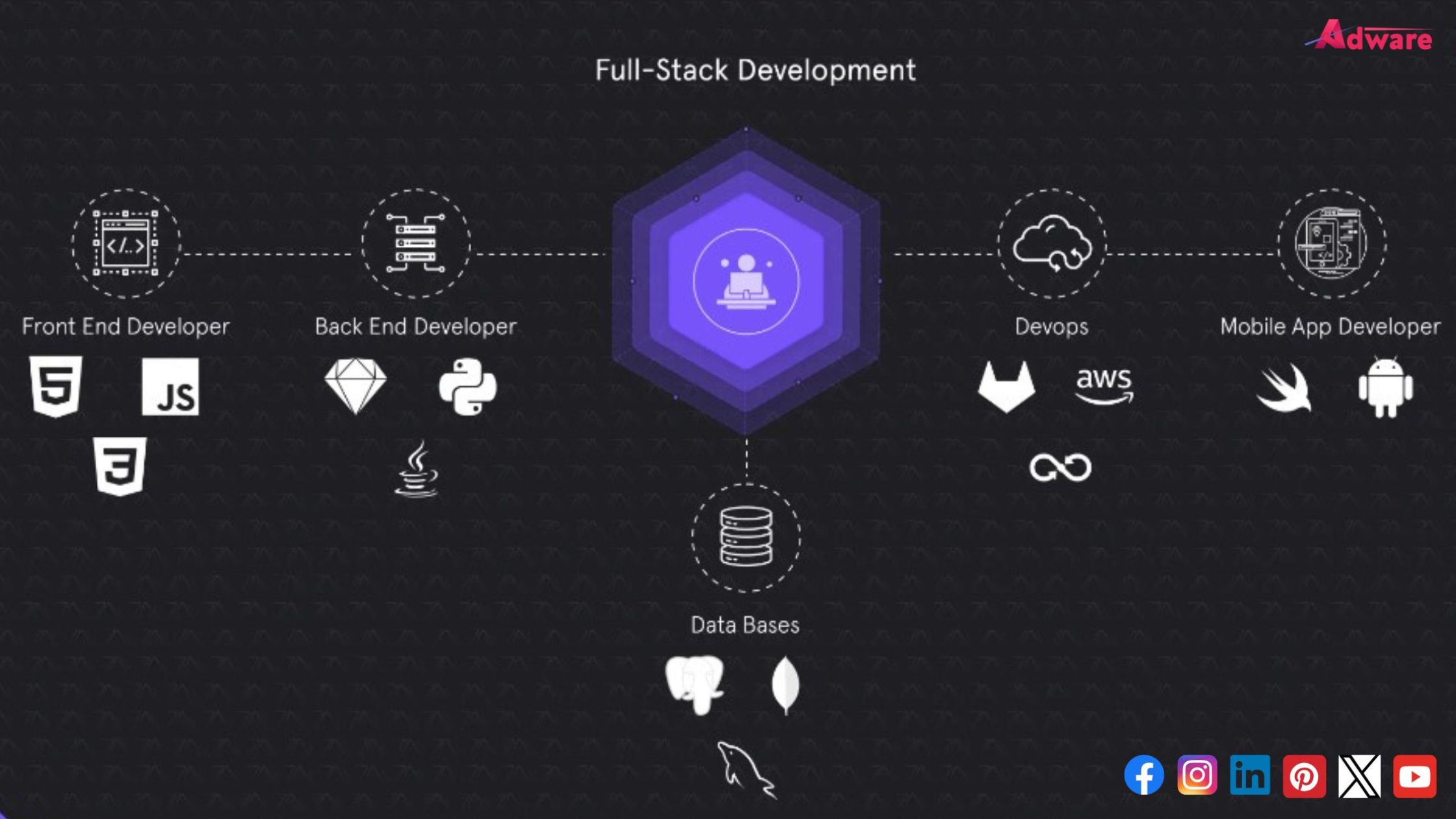In the past, businesses had limited choices when it came to hiring web developers. They could only select specialized experts such as frontend or backend developers. However, as technology requirements evolved, newer and more advanced technical stacks emerged. One of these stacks is Full Stack Development, which has proven to be a more accurate and consistent approach to web development company. It empowers businesses to choose from a wide range of development tools to match their needs in the ever-changing tech landscape.
Full-stack developers possess the capability to manage projects from start to finish, making them invaluable assets for modern businesses. As the forecasted growth in the web development industry presents significant opportunities, full-stack developers are currently enjoying the largest share of the market. Virtually every company, regardless of its size, is opting for full-stack development services due to the multifaceted advantages they offer. However, many enterprises and individuals still harbor doubts about hiring full-stack developers.
In this comprehensive guide to full-stack web development, we aim to dispel any confusion. We will provide you with insights into the entire full-stack development process, including its advantages and disadvantages. This information will be accompanied by pointers on relevant technical challenges, helping you gain a better understanding and make well-informed decisions. Let's dive in.
The basics of Full-stack web development
Full-stack web development is a multifaceted approach to building web applications that encompasses both the frontend and backend aspects of development. Full-stack developers are skilled in a wide range of technologies and possess the capability to work on all layers of a web application, from the user interface to the server and database. Here are the fundamental aspects of full-stack web development:
Frontend Development: Frontend development focuses on the user interface and user experience of a web application. Full-stack developers use technologies like HTML, CSS, and JavaScript to create the visual elements of a website.
They also work with frontend frameworks and libraries such as React, Angular, or Vue.js to build interactive and responsive user interfaces.
Backend Development: Backend development involves building the server-side logic and database components that power a web application.
Full-stack developers use programming languages like Python, Ruby, Node.js, or Java to create server-side code.
They work with web frameworks like Express.js, Django, Ruby on Rails, or Spring Boot to streamline backend development tasks.
Database Management: Full-stack developers are proficient in working with databases, including relational databases like MySQL, PostgreSQL, or NoSQL databases like MongoDB.
They design and maintain databases, write queries, and ensure data integrity for web applications.
API Development: APIs (Application Programming Interfaces) are essential for communication between frontend and backend components. Full-stack developers design and implement APIs that enable data exchange and functionality between the two.
Technologies such as RESTful APIs or GraphQL are commonly used in full-stack development.
Version Control: Full-stack developers are well-versed in using version control systems like Git to collaborate with other team members and track changes in the codebase.
Deployment and DevOps: They handle the deployment of web applications to production servers and may have expertise in DevOps practices to ensure smooth operations.
Knowledge of containerization tools like Docker and orchestration tools like Kubernetes can be beneficial.
Security: Full-stack developers are responsible for implementing security measures to protect web applications from vulnerabilities and attacks. This includes securing data, authentication, and authorization.
Testing: They write unit tests, and integration tests, and perform end-to-end testing to ensure the reliability and functionality of the application.
Problem Solving: Full-stack developers possess strong problem-solving skills and the ability to troubleshoot issues that may arise on both the front end and back end.
Continuous Learning: The technology landscape is constantly evolving. Full-stack developers stay updated with the latest tools, frameworks, and best practices to deliver modern and efficient web applications.
In summary, full-stack web development is a comprehensive skill set that enables developers to create complete web applications from start to finish. It requires proficiency in frontend technologies, backend programming, database management, and various other aspects of web development, making full-stack developers versatile and valuable assets to development teams.
The expertise of the full-stack developers
Full-stack developers are versatile professionals with expertise that spans across various domains of web development. Their knowledge and skills encompass both frontend and backend development, making them valuable assets in building complete web applications. Here's a closer look at the expertise of full-stack developers:
Frontend Development: Full-stack developers are proficient in frontend technologies, including:
HTML/CSS: They can create and style web pages using HTML for content structure and CSS for layout and design.
JavaScript: They are skilled in JavaScript, enabling them to add interactivity and functionality to web applications.
Frontend Frameworks: Full-stack developers often have experience with frontend frameworks such as React, Angular, or Vue.js, which facilitate the development of dynamic and responsive user interfaces.
Backend Development: They are capable of handling server-side development:
Programming Languages: Full-stack developers are well-versed in languages like Node.js, Python, Ruby, Java, or PHP, which they use to build server-side logic.
Backend Frameworks: They have expertise in backend frameworks like Express.js (Node.js), Django (Python), Ruby on Rails (Ruby), Spring Boot (Java), or Laravel (PHP) to streamline backend development tasks.
Database Management: They can design and manage databases, write efficient queries, and ensure data integrity. Knowledge of both relational and NoSQL databases is common.
API Development: Full-stack developers create and maintain APIs (Application Programming Interfaces) to facilitate communication between frontend and backend components. This includes designing RESTful APIs or implementing GraphQL.
Version Control: They are skilled in using version control systems like Git for collaboration, code tracking, and managing changes in the codebase.
Deployment and DevOps: Full-stack developers can handle the deployment of web applications to production servers. They may also have expertise in DevOps practices, including automation, continuous integration, and containerization (e.g., Docker) to ensure smooth operations.
Security: They implement security measures to protect web applications from common vulnerabilities and attacks, including securing data, implementing authentication and authorization mechanisms, and adhering to best security practices.
Testing: Full-stack developers write various types of tests, such as unit tests, integration tests, and end-to-end tests, to ensure the reliability and functionality of the application. They also perform debugging and troubleshooting when issues arise.
Problem Solving: They possess strong problem-solving skills and the ability to identify and resolve issues on both the front end and backend. They can troubleshoot and optimize code for performance and efficiency.
Continuous Learning: Full-stack developers stay updated with the rapidly evolving web development landscape. They adapt to new tools, frameworks, and best practices to deliver modern and efficient web applications.
Project Management: Some full-stack developers are capable of end-to-end project management, including requirements gathering, project planning, and coordination among team members.
In summary, full-stack developers are well-rounded professionals who bridge the gap between frontend and backend development. Their expertise enables them to contribute to all aspects of web application development, making them valuable team members who can drive projects from conception to completion.
Technological offerings by full-stack developers
Full-stack developers bring a wide range of technological offerings to the table, as they are well-versed in both frontend and backend development. Here's a breakdown of the technological offerings provided by full-stack developers:
Frontend Technologies:
HTML/CSS: Full-stack developers use HTML for structuring web content and CSS for styling, ensuring a visually appealing user interface.
JavaScript: They leverage JavaScript to add interactivity, perform client-side scripting, and create dynamic user experiences.
Frontend Frameworks: Full-stack developers often work with frontend frameworks such as React, Angular, or Vue.js to streamline frontend development and build responsive, feature-rich web applications.
Backend Technologies: Programming Languages: They are proficient in programming languages like Node.js, Python, Ruby, Java, or PHP, depending on the project's requirements.
Backend Frameworks: Full-stack developers utilize backend frameworks such as Express.js (Node.js), Django (Python), Ruby on Rails (Ruby), Spring Boot (Java), or Laravel (PHP) to expedite backend development tasks and maintain code consistency.
Database Management: They design, develop, and manage databases using technologies like MySQL, PostgreSQL, MongoDB, or others, ensuring data integrity and efficient data storage and retrieval.
API Development: Full-stack developers create and maintain APIs (Application Programming Interfaces) to enable communication between frontend and backend components. This includes designing RESTful APIs or implementing GraphQL for efficient data exchange.
Version Control: They employ version control systems like Git to track changes, collaborate with team members, and maintain code repositories effectively.
Deployment and DevOps: Full-stack developers are capable of deploying web applications to production servers. They may use technologies like Docker for containerization and orchestration tools like Kubernetes for managing application deployments.
Some full-stack developers are versed in DevOps practices, including continuous integration and continuous deployment (CI/CD) pipelines, automation, and infrastructure as code (IaC) using tools like Jenkins, Travis CI, or GitLab CI/CD.
Security: They implement security measures to protect web applications, including data encryption, authentication mechanisms, and authorization controls. They stay updated on security best practices and vulnerabilities to ensure application security.
Testing:
Full-stack developers write comprehensive test suites, including unit tests, integration tests, and end-to-end tests, using testing frameworks and libraries specific to their tech stack (e.g., Jest, Mocha, Selenium).
They conduct testing to identify and resolve bugs, ensuring the reliability and functionality of the application.
Problem Solving: They possess strong problem-solving skills and the ability to troubleshoot and optimize code for performance and efficiency, addressing issues on both the front end and back end.
Continuous Learning: Full-stack developers stay current with emerging technologies, tools, and best practices. They adapt to industry trends and incorporate new solutions into their projects.
Project Management: Some full-stack developers are capable of managing projects from start to finish. They participate in requirements gathering, project planning, and coordination among team members.
In summary, full-stack developers offer a broad spectrum of technological expertise, making them valuable assets for comprehensive web application development. Their ability to work seamlessly on both frontend and backend components allows them to deliver end-to-end solutions and adapt to various project requirements and technologies.
Benefits of full stack development services
Full-stack development services offer a multitude of benefits to businesses and organizations looking to build web applications and digital solutions. Here are some of the key advantages:
Cost-Efficiency: Full-stack developers are versatile and capable of handling both front-end and back-end development. This reduces the need to hire separate specialists, resulting in cost savings for businesses.
Faster Development: With expertise in multiple areas, full-stack developers can work on all aspects of a project concurrently, accelerating the development process. This leads to quicker time-to-market for web applications.
Streamlined Communication: Having a single developer or team responsible for both front-end and back-end ensures seamless communication and coordination, reducing the risk of miscommunication and enhancing project efficiency.
Consistency: Full-stack developers can maintain consistency in code quality and architecture throughout the entire application. This consistency leads to more maintainable and scalable solutions.
Adaptability: Full-stack developers are well-equipped to adapt to changing project requirements and technologies. They can easily switch between frontend and backend tasks as needed, making them valuable assets for agile development.
Reduced Dependency: Businesses are less dependent on external resources or specialized talent when they have full-stack developers on their team. This independence leads to greater flexibility in project management and resource allocation.
Holistic Problem Solving: Full-stack developers possess a comprehensive view of the application, allowing them to identify and solve problems more effectively. They can address issues on both the client and server sides.
End-to-End Responsibility: Full-stack developers take ownership of projects from conception to deployment, ensuring a seamless development lifecycle. This accountability results in a more cohesive and integrated final product.
Cost-Effective MVP Development: For startups and small businesses, full-stack developers are ideal for building Minimum Viable Products (MVPs) quickly and affordably, helping validate ideas and secure funding.
Efficient Collaboration: Full-stack developers can collaborate with cross-functional teams, including designers, product managers, and QA testers, making it easier to iterate on the application and meet business objectives.
Versatile Skill Set: The skill set of full-stack developers often extends beyond web development, allowing them to contribute to various aspects of a project, such as mobile app development, serverless computing, or cloud integration.
Continuous Learning: Full-stack developers are accustomed to staying up-to-date with emerging technologies and best practices. This commitment to learning ensures that projects benefit from the latest innovations.
Scalability: Full-stack developers can design applications with scalability in mind, ensuring that the architecture and codebase can handle increased loads and user growth.
Reduced Risk: The ability to handle both frontend and backend development reduces the risk of delays and misalignment between different development teams, leading to smoother project execution.
Customization: Full-stack developers can tailor solutions to specific business needs, leveraging their expertise to create unique and tailored web applications.
In conclusion, full-stack development services offer businesses a comprehensive and efficient approach to web application development. Their versatility, ability to reduce costs, and streamlined communication make them valuable assets for building successful digital solutions.
Cons of full stack development services
While full-stack development services offer numerous advantages, there are also some potential drawbacks and challenges to consider:
Limited Specialization: Full-stack developers are proficient in both frontend and backend development, but they may not have the deep expertise of specialists in either area. This could lead to suboptimal solutions for complex or specialized projects.
Resource Constraints: Full-stack developers may become overloaded when handling multiple aspects of a project, potentially leading to burnout or a compromise in the quality of work.
Learning Curve: Keeping up with a broad range of technologies can be challenging, and full-stack developers need to invest time in continuous learning to stay current, which may impact project timelines.
Complexity: For large and complex projects, a single full-stack developer may not be sufficient to manage all aspects effectively, necessitating the involvement of additional specialists.
Slower Development for Niche Technologies: Full-stack developers may not be well-versed in niche or specialized technologies, and adopting these technologies might slow down development or require external expertise.
Risk of Shallow Knowledge: With a broad skill set, full-stack developers may have shallow knowledge in certain areas. This can be a concern when dealing with intricate or security-critical components.
Dependency on Individual Talent: Relying heavily on a single full-stack developer can pose a risk if that individual leaves the team or becomes unavailable.
Limited Scalability: Scaling a development team with full-stack developers may be less straightforward than adding specialists when handling larger and more complex projects.
Design and User Experience Challenges: While full-stack developers can create functional user interfaces, they may not possess the same design and user experience expertise as dedicated designers, potentially resulting in less visually appealing applications.
Overlooked Specialized Tools: Full-stack developers might default to familiar tools or technologies, potentially missing out on specialized tools that could better address certain project requirements.
Potential for Inefficiency: Full-stack developers may spend time on tasks outside their core competencies, which can be less efficient compared to specialists focused solely on those tasks.
Risk of "Jack of All Trades, Master of None": The breadth of skills required for full-stack development may lead to a situation where the developer is proficient in many areas but not truly masterful in any specific domain.
Higher Compensation: Experienced full-stack developers who can handle both frontend and backend development often command higher salaries due to their versatility.
In conclusion, while full-stack development services offer versatility and efficiency, they also come with potential downsides related to expertise, workload, and specialization. The decision to opt for full-stack development should be made considering the specific needs and complexity of the project at hand.
conclusion
Full-stack web development is not just another development approach; it's a meticulously crafted method for assembling the complete web solution. A full-stack development team possesses the capability to deliver practical web solutions that stand out. Full-stack developers are earning a growing reputation and trust among enterprises that prioritize rapid product launches and growth. Their unique skill sets and agility allow them to meet these demands effectively.
If you're in search of full-stack development services for your next project, you've come to the right place. We are a leading full-stack development company, boasting a team of top-notch full-stack developers. Get in touch with us today to discuss your project. Thank you for reading!




Comments (0)